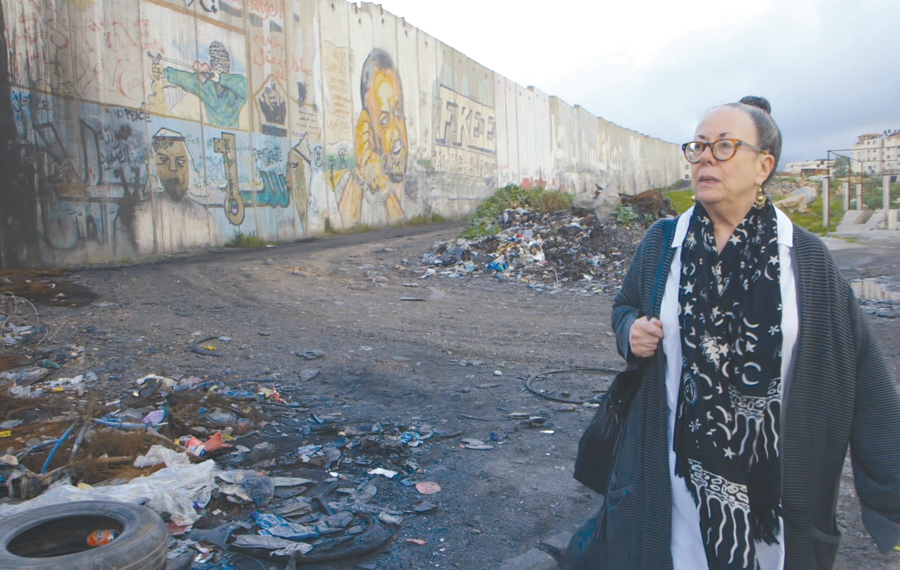 Ofra Bloch in “Afterward.” Photo courtesy of Afterward Productions
Ofra Bloch in “Afterward.” Photo courtesy of Afterward Productions In a time of extreme divisiveness and escalating hate, filmmakers often look to history for answers. In her provocative documentary “Afterward,” Jerusalem-born, American-based psychoanalyst and first-time filmmaker Ofra Bloch explores the narratives of deep-seated hatred behind the Holocaust and the Israeli occupation. During on-camera interviews with survivors, former neo-Nazis, Israelis and Muslims, Bloch uncovers truths about herself.
“The Holocaust has played a major role in my life. It has become an obsession,” said Bloch, whose practice focuses on treating trauma victims. Her great-uncle was a survivor, as is her husband, and she vividly remembers listening to the 1961 trial of Adolf Eichmann, one of the architects of the Holocaust, on the radio. “She was raised to hate Germans and thought talking to some might help her sort out those feelings. In 2013, she flew to Germany, where she did seven interviews and she came away with the realization that she was brought up to fear and hate Palestinians as well.”
Over the next few years, she sought out subjects and had varying success. There were people who agreed to talk and changed their minds. Others suddenly disappeared. Ultimately, she did seven additional interviews with Palestinians, among them a peace activist who co-founded a bereaved parents’ organization after the death of his daughter, and a woman who believes that any form of resistance to the Israeli occupation is justified. For Bloch, listening to the latter was as challenging as being in the same room with the former leader of a neo-Nazi movement, but the circumstance was quite different. As a Jew in Germany, she was the victim. But to Palestinians, she represented the Israeli oppressor.
“The distance between being a victim and a victimizer is very small. Each of us has the capacity to be a victimizer under certain conditions,” Bloch said. “Here I was, filling both roles. I’ve lived in the United States for almost 40 years, but I realized my complicity in the occupation and it was shocking. Israel is no longer my home but the umbilical cord is not cut. I can’t pretend that I haven’t been part of it.”
In presenting a balanced story, Bloch had some concern that Jews would think she was equating the Holocaust and the Nakba (literally “catastrophe,”), which the Palestinians commemorate after the 1948 establishment of the State of Israel and the subsequent expulsion and/or fleeing of their people from their homes during the war that ensued.
“I don’t believe in forgiveness. You can’t forgive the unforgiveable. But we can put that aside and reach a place of reconciliation. People are dying for land on both sides. If we don’t learn to share it, we will all meet in the cemeteries.”
“I don’t believe you can measure or compare suffering,” she said. “There is no scale. The two events appear in the film because one had an impact on the other and are part of the collective identities of two groups of people. I think we can discuss the suffering of another people without taking away from the importance of the Holocaust.”
Bloch’s approach to the interviews was that of an “active listener. I didn’t go there to argue or challenge. I wanted to emphasize the experience of learning something new and being listened to,” she said. “Ignorance is the basis of every conflict. If we just listen to each other without judgment, without evaluating, the fences can come down. When that happens on both sides, there is a mutual acknowledgement and dialogue can begin.”
Bloch believes in the capacity for change and the possibility of peace in the Middle East. “I don’t believe in forgiveness,” she said. “You can’t forgive the unforgiveable. But we can put that aside and reach a place of reconciliation by lowering the expectations a little bit. People are dying for land on both sides. If we don’t learn to share it in one form or another, we will all meet in the cemeteries.”
The daughter of Zionist secular Jews, Bloch was raised with what she calls “Jewish humanistic values: love thy neighbor as thyself. I’ve tried to live accordingly,” she said. She doesn’t have her next project lined up, but one idea she’s considering involves American politics. “In this country there’s such a divide between Democrats and Republicans. There’s no communication. People are just angry and don’t try to understand. You have to have the courage to listen to what you don’t want to know.”
Meanwhile, Bloch hopes to reach young people by showing “Afterward” in schools and colleges. “I want the next generation to realize they can do something, and not take things as they are,” she said. “We have to unlearn the stories we were told and not be bystanders. We should be fighters for peace. At this time of rising anti-Semitism and racism, we must learn from the past,” she emphasized. “In terms of the Holocaust we say ‘Never again,’ but that cannot be limited to Jews. It should be applied to everybody.”
“Afterward” opens Jan. 20 at the Laemmle Royal, Playhouse 7 and Town Center 5. Ofra Bloch will participate in a Q&A after the screening at the Royal at 7:30 p.m. Jan. 20.






















 More news and opinions than at a Shabbat dinner, right in your inbox.
More news and opinions than at a Shabbat dinner, right in your inbox.